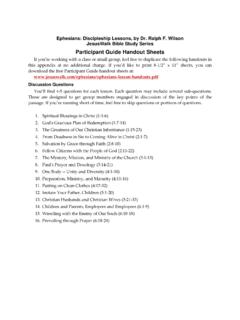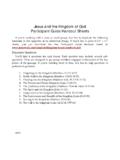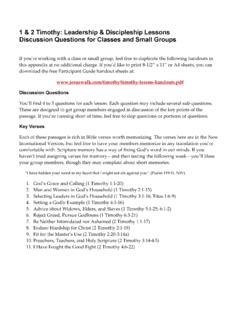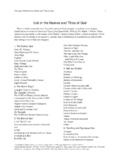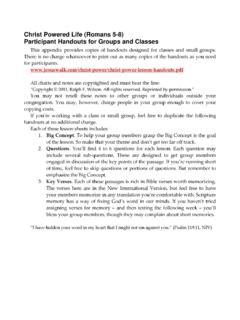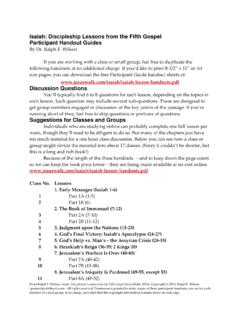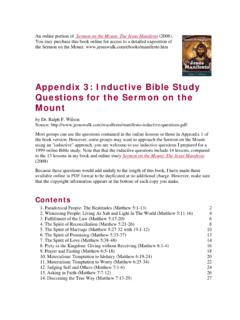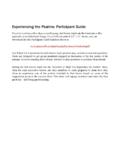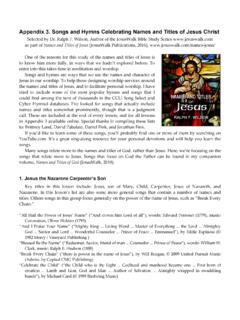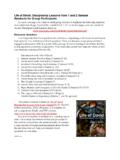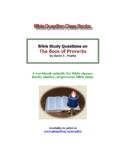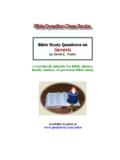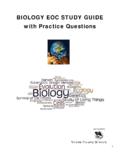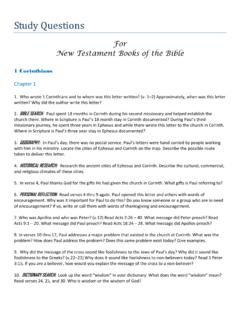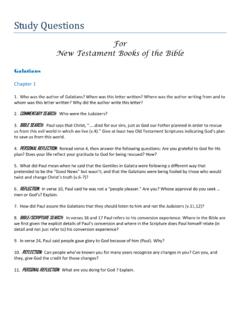Transcription of Letter of James Inductive Bible Study Questions
1 Letter of James Inductive Bible Study Questions By Dr. Ralph F. Wilson These Questions are intended for a group that seeks to draw all the meaning out of the text, rather than a teacher led group. They are thought provoking and designed to help the group members discover the full meaning of the passage. If you plan to teach on the passage intermixed with discussion, consider the discussion Questions contained in Letter of James : Discipleship Lessons on Practical Faith (JesusWalk Publications, 2005, 2012), by Ralph F. Wilson You are free to copy these Questions for members of your group. Lessons 1. Experiencing Joy in Trials ( James 1:1 18) 2. Hearing and Practicing the Word ( James 1:18 27) 3. Forsaking Favoritism for Love ( James 2:1 13) 4. Energizing Your Faith by Works ( James 2:14 26) 5. Attaining Tongue Taming Wisdom ( James 3:1 18) 6. Submitting Yourself to God ( James 4:1 12) 7. Learning Patience in an Instant Age ( James 4:13 5:12) 8.
2 Praying the Prayer of Faith ( James 5:13 20) Letter of James : Inductive Bible Study Questions are copyright 2005, Ralph F. Wilson. All rights reserved. Permission is given to use these sheets at no charge in any Christian church, class, or group without charge, so long as they are not reprinted on the Internet or published for use outside the individual group or congregation. Letter of James : Inductive Bible Study Questions 2 1. Experiencing Joy in Trials ( James 1:1-18). Learning to experience God's blessing in suffering. Level 1: Observation Questions . What Does the Text Say? Read the passage and list at least two good things that come out of trials and tribulations. What words seem to be repeated again and again in this passage? Based on that, what does the theme of the passage seem to be? Level 2: Interpretation Questions . What Does the Text Mean? Comment: The word translated perseverance (NIV), patience (KJV), and steadfastness (RSV) is Greek hupomon , patience, endurance, fortitude, steadfastness, perseverance,' especially as they are shown in the enduring of toil and suffering (BAGD).
3 (1:2 4) If trials produce perseverance, what does perseverance produce? How is perseverance important to Christian faith? (1:5) Verse 5 is a promise to be explored especially in times of trial. What is the main offer of this promise? What does it mean that God gives generously to all without finding fault ? When do we find ourselves giving with this spirit? When do we fall short of this spirit of giving? (1:6 8) In what areas of life can we be of two minds? How does double . mindedness undermine the Christian faith? Why does double mindedness undermine receiving from God? (1:12) If we are saved by grace, not by works (Ephesians 2:8 9) which we are why is receiving the crown of life dependent upon persevering under trial? This verse talks about loving God a strange concept to many people; how do we experience this love? Comment: The words translated tempt/temptation in verses 13 14, are the same words translated trial/testing in verse 2 3.
4 (1:13) Does God test or try us? Does God allow evil in his world? Does God test or try us with evil? What is the difference between testing and tempting? (1:14 15) What do evil desires have to do with double mindedness? If the strength of temptations are rooted in our own evil desires, how do we conqueror temptation? Letter of James : Inductive Bible Study Questions are copyright 2005, Ralph F. Wilson. All rights reserved. Permission is given to use these sheets at no charge in any Christian church, class, or group without charge, so long as they are not reprinted on the Internet or published for use outside the individual group or congregation. Letter of James : Inductive Bible Study Questions 3 Extra Credit. Jesus' temptation in the wilderness seems to be external, from Satan, not internal, that is, drawing strength from corrupt desires. In the light of James 1:13 14, was Jesus' temptation real?
5 Support your answer. (1:16 17) What deception about God are these verses designed to counter? What deception about God is verse 13 designed to counter? How are these truths along with verse 5 meant to be an encouragement in trial? (1:2) After studying this passage, why should Christians be joyful when they are tested? Level 3: Application Questions . What Does It Mean to Me? Are your biggest struggles to endure the testings from God? Or to resist the temptations induced by wrong desires in your heart? 3:2 Which verse in this passage do you find the most encouraging? Why? Letter of James : Inductive Bible Study Questions are copyright 2005, Ralph F. Wilson. All rights reserved. Permission is given to use these sheets at no charge in any Christian church, class, or group without charge, so long as they are not reprinted on the Internet or published for use outside the individual group or congregation.
6 Letter of James : Inductive Bible Study Questions 4 2. Hearing and Practicing the Word ( James 1:18-27). Translating God's lessons to practical Christian living Level 1: Observation Questions . What Does the Text Say? List the descriptive phrases in which word is used in this passage. Level 2: Interpretation Questions . What Does the Text Mean? (1:18) In what sense are we given spiritual birth by the word of truth ? Comment: The word translated firstfruits is Greek aparch , a sacrificial technical term, first fruits' of any kind (including animals, both domesticated and wild), which were holy to the divinity and were consecrated before the rest could be put to secular use (BAGD 81). For examples, see Exodus 22:29; Leviticus 2:12 16; Numbers 18:12; Deuteronomy 18:4; 2 Chronicles 31:5; Nehemiah 10:35 39. (1:18b) Extra Credit. In what sense are we Christians firstfruits of creation? (1:18 19) In what way do the ideas of listen, speak, and anger in verse 19 relate to the phrase word of truth in verse 18?
7 (1:20) Why doesn't our anger accomplish God's justice and righteousness? How does our anger relate to hearing the word and practicing it? (1:21) In what way are moral filth and God's Word opposites? How does God's implanted word rescue us? Who implants the Word? (1:22) Why are we so easily fooled that listening to Bible teaching means that we are living out righteous lives? What is the nature of the self deception? (1:23 25) What is the point of comparison between looking into a mirror and remembering what you look like, and looking into the perfect law ? (1:25) How can the perfect law give freedom and liberty? Isn't that a contradiction in terms? An oxymoron? Comment: Verses 26 27 use a general word for religion, both an adjective and a noun. The noun is Greek thr skeia, the worship of God, religion,' especially as it expresses itself in religious service' or cult.' The adjective is thr skos, religious (BAGD 363).
8 (1:26 27) Extra Credit. Is the word religion/religious in these verses used in a positive or negative sense? (1:26) Why is tongue control so essential to practical Christianity? How does this relate to the phrase word of truth in verse 18? Letter of James : Inductive Bible Study Questions are copyright 2005, Ralph F. Wilson. All rights reserved. Permission is given to use these sheets at no charge in any Christian church, class, or group without charge, so long as they are not reprinted on the Internet or published for use outside the individual group or congregation. Letter of James : Inductive Bible Study Questions 5 (1:27a) What is there about helping widows and orphans that is such a keen barometer of our Christian maturity? 2:12 (1:27b) How does the concept of being polluted by the world (verse 27) relate to the phrase word of truth (verse 18) and moral filth (verse 21)? Why are Christians so susceptible to this kind of pollution?
9 Level 3: Application Questions . What Does It Mean to Me? Give an example from your experience of how a person with poor tongue control considered himself or herself an outstanding Christian. How could this person be so utterly deceived? What is the biggest area you struggle with when it comes to living out God's Word? Have you ever been self deceived in this area? How did you recover from the deception? Letter of James : Inductive Bible Study Questions are copyright 2005, Ralph F. Wilson. All rights reserved. Permission is given to use these sheets at no charge in any Christian church, class, or group without charge, so long as they are not reprinted on the Internet or published for use outside the individual group or congregation. Letter of James : Inductive Bible Study Questions 6 3. Forsaking Favoritism for Love ( James 2:1-13). Recognizing and repudiating partiality toward others. Level 1: Observation Questions .
10 What Does the Text Say? Comment: (2:1) The word translated respect of persons (KJV), favoritism (NIV, NASB), or partiality (RSV) is Greek prosp l mpsia partiality (BAGD 720). It translates a Hebrew idiom for panim nasa, to lift up the face on a person,' to be favorable and so partial to him. Look up in an English dictionary the words: partial, bias, favoritism. Look up where this concept is used in the NT of God: Acts 10:34; Romans 2:11; Ephesians 6:9; Colossians 3:25. How is favoritism is contrary to God's nature? Share a time when you were the object of prejudice on the basis of race, religion, social standing, physical appearance, intelligence, etc. How did it make you feel? Level 2: Interpretation Questions . What Does the Text Mean? (2:2 4) What motivation do people have for showing favor to the rich? (2:2 4) What is the underlying motivation for ignoring or insulting the poor? (2:4) In what way does favoritism make one a judge?
